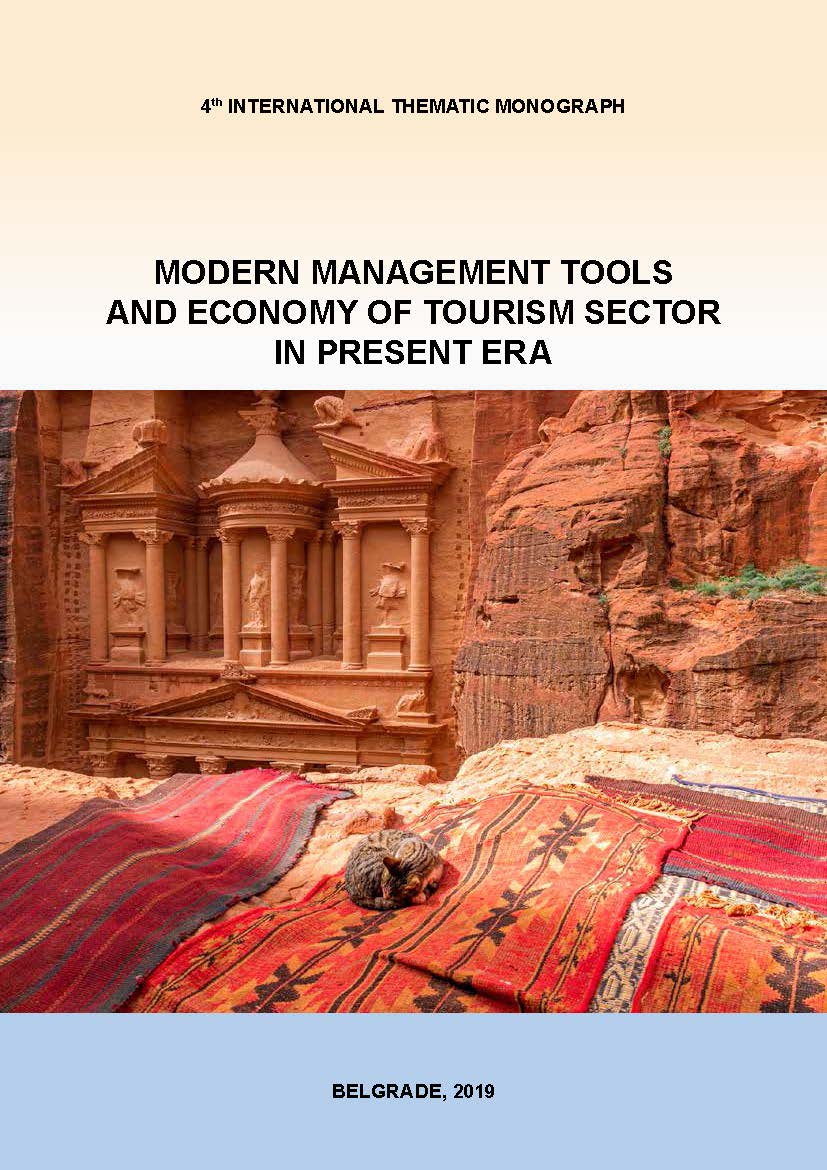|
ADVANTAGES OF SUSTAINABLE TOURISM IN THE FUNCTION OF DEVELOPMENT OF RURAL AREAS OF REPUBLIC SERBIA – EXAMPLE OF WINERIES Tatjana Jovanović Olga Gavrić Agrifaculty, University of Belgrade, Nemanjina 6, Zemun, Serbia DOI: https://doi.org/10.31410/tmt.2019.371 4th International Thematic Monograph - Modern Management Tools and Economy of Tourism Sector in Present Era, Belgrade, 2019, Published by: Association of Economists and Managers of the Balkans in cooperation with the Faculty of Tourism and Hospitality, Ohrid, North Macedonia; ISSN 2683-5673, ISBN 978-86-80194-29-5; Editors: Vuk Bevanda, associate professor, Faculty of Social Sciences, Belgrade, Serbia; Snežana Štetić, full time professor, The College of Tourism, Belgrade, Serbia, Printed by: SKRIPTA International, Belgrade
|
|
Abstract: Sustainable development is becoming a key factor in explaining the increasing socio-economic changes in our country and in the world. A common feature of sustainable and rural development is the insistence on the diversity of rural areas, which emphasizes their self-sustainability with adequate strategies and innovative solutions. The aim of the paper is to examine the potential of wine tourism in the context of adopting the principles and standards of sustainability in Serbia. In this connection, the subject of this paper is to point out the importance of the connection between sustainable and rural development, multifunctionality of agriculture and wine tourism in rural areas of the Republic of Serbia. Keywords: Sustainable Development, Multifunctional Agriculture, Wine Tourism, Rural Development. REFERENCES Bardi, U. (2017). Seneca effect: why growth is slow, but collapse is rapid?. Springer. Bogdanov, N. (2015). Ruralni razvoj i ruralna politika. Beograd: Poljoprivredni fakultet Univerziteta u Beogradu. European Environmental Agency (2015). SOER 2015 - The European environment - state and outlook 2015. Synthesis report. Holmberg, J. (2009). Put ka održivom razvoju. In Održivi razvoj Srbije: naša zajednička budućnost: Nacionalna strategija održivog razvoja (pp. 12-19). Beograd: Ministarstvo za nauku i tehnološki razvoj. Janković, D. (2011). Održivi turizam. In Putokaz ka obnovljivom razvoju (pp. 366-390). Beograd: Ministarstvo za nauku i tehnološki razvoj. Jelić, S., & Jovanović, T. (2018). Selo u vrtlogu promena, Monografija. Beograd: Poljoprivredni fakultet Univerziteta u Beogradu. Jelić, S., Jovanović, T., & Gavrić, O. (2019). Households as a main factor of rural and sustainable development in the Republic of Serbia. VIII International symposium on agricultural sciences AgroRes 2019, 16-18 May (pp. 229-240). Trebinje, Bosnia. Jovanović-Gavrilović, B. (2008). Ciljevi i indikatori održivog razvoja u Evropi. In Nova generacija evropskih dokumenata održivog razvoja i pouke za Srbiju (tematski zbornik) (pp. 31-47). Beograd: Ekonomski fakultet. Montella, M. M. (2017). Wine tourism and sustainability: A review, Sustainability 9(1):113, Retrieved from: https://www.researchgate.net/publication/312353932_Wine_Tourism_and_ Sustainability_A_Review Pešić, R. (2012). Ekonomika životne sredine i prirodnih resursa, Beograd: Poljoprivredni fakultet. Santini, C., Cavicchi, A., & Casini, L. (2013). Sustainability in the wine industry: Key questions and research trends A. Agric. Food Econ. 1, 1. Stojadinović, D. (2011). Obnovljivi izvori energije. In Putokaz ka obnovljivom razvoju (pp. 330- 346). Beograd: Ministarstvo za nauku i tehnološki razvoj. INTERNET ADDRESSES www.zelenaenergija.pks.rs https://www.rs.undp.org/content/serbia/sr/home/sustainable-development-goals.html
| |||||||
Association of Economists and Managers of the Balkans
- UdEkoM Balkan -
179 Ustanicka St, 11000 Belgrade, Republic of Serbia
E-mail: [email protected]
www.udekom.org.rs
- UdEkoM Balkan -
179 Ustanicka St, 11000 Belgrade, Republic of Serbia
E-mail: [email protected]
www.udekom.org.rs
Tel. +381 62 812 5779
VAT number: 108747027
Registration number.: 28157347
Registration number.: 28157347


